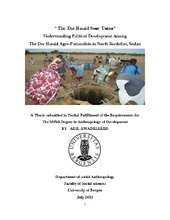"The Dar Hamid Sons' Union". Understanding Political Development Among The Dar Hamid Agro-Pastoralists In North Kordofan, Sudan
Master thesis
Permanent lenke
https://hdl.handle.net/1956/6386Utgivelsesdato
2012-07-16Metadata
Vis full innførselSamlinger
Sammendrag
The main theme In this thesis I explore the mobilization of a particular civil society organization among the Dar Hamid agro pastoralist people in northern Kordofan, western Sudan . The analysis is based upon information gathered from people living in the Dar Hamid homeland in northern Kordofan , and among Dar Hamid association elites in Khartoum. The fieldwork period was between June and December 2011. The mobilization of civil society organizations in the Sudan has been and continues to be related to social change and to changes in political awareness among agro-pastoralist people. This is also the case for the Dar Hamid Sons Union. My discussion will therefore link the description and analysis of the start, organization and practices of the union with such changes in the Dar Hamid region in North Kordofan. I aim to show some of the ways in which the Dar Hamid Sons Union interpreted and negotiated the political and organizational spaces they found themselves in, including what their stated aims were, how they related to people at the grass-roots level, to local, regional and national levels of the government, and how in the process they were able to maintain and redefine the identity of their organization in changing political games and circumstances. The important question here is to explore to what extent the Union is part of a development that signals an increasing political awareness and participation on the part of local Dar Hamid people, or whether the Union is part of the cooptation strategy carried out by the government, through which such unions are part of a government strategy of infiltrating what is called the civil society.
